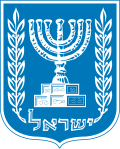| ||||||||||||||
| ||||||||||||||
| ||||||||||||||
| Part of a series on the |
 |
|---|
An election for President of Israel was held in the Knesset on 24 March 1993, [1] following the end of Chaim Herzog's second five-year term in office.
| ||||||||||||||
| ||||||||||||||
| ||||||||||||||
| Part of a series on the |
 |
|---|
An election for President of Israel was held in the Knesset on 24 March 1993, [1] following the end of Chaim Herzog's second five-year term in office.
Ezer Weizman, former Israeli Air Force commander and Defense Minister of Israel, ran against Dov Shilansky, a Likud politician. The Knesset elected Weizman, by a majority of 66 to 53 to serve as the next President of Israel. He assumed office on May 13, 1993.
| Candidate | Party | Votes | % | |
|---|---|---|---|---|
| Ezer Weizman | Israeli Labor Party | 66 | 55.46 | |
| Dov Shilansky | Likud | 53 | 44.54 | |
| Total | 119 | 100.00 | ||
| Valid votes | 119 | 99.17 | ||
| Invalid votes | 0 | 0.00 | ||
| Blank votes | 1 | 0.83 | ||
| Total votes | 120 | 100.00 | ||
| Registered voters/turnout | 120 | 100.00 | ||